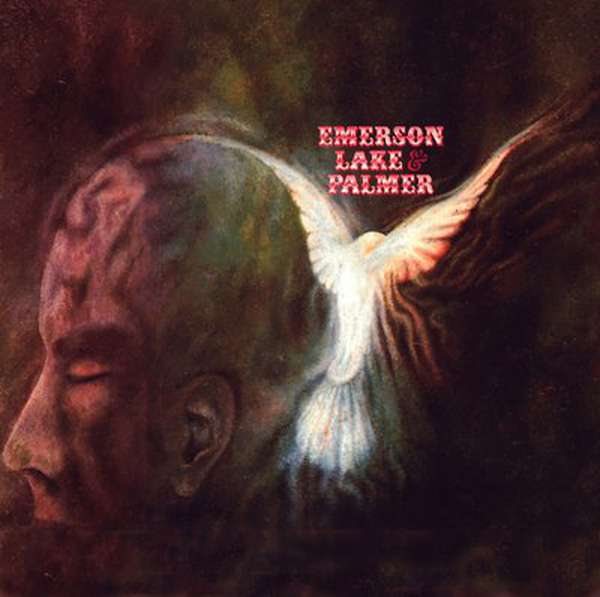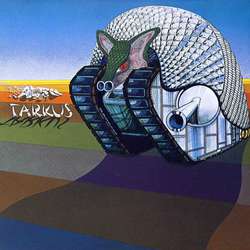Emerson, Lake & Palmer, in addition to being amongst the first and most recognizable supergroups ever, have somewhat of a divided reputation. Either they're the ultimate expression of talented rock musicianship, each member being an established virtuoso musician in his own right, or they're the posterchildren for everything that there is to hate about progressive rock, creating music that can be excessively grandiose and inaccessibly obtuse. Whatever your feelings on their music, however, their influence on modern rock music cannot be denied, which makes Razor & Tie's new reissue series all the more welcome. Featuring only the cream of ELP's discography (no, you won't have to suffer through Love Beach again), the series offers a chance to revisit some of the most controversial music of the seventies from a modern perspective, starting where it all began, with their eponymous 1970 debut.
The first disc (out of three!) is the original album itself, unaltered save for a remaster. Though I was never the biggest fan of ELP's debut, I could always see what the appeal in it was. Emerson, Lake, and Palmer all came from substantially different musical backgrounds, and accordingly, this album is a collection of pieces designed to highlight each member's particular area of instrumental expertise, in addition to showing off what they could accomplish with their combined talents. In other words, it acts as a great summary introduction to an equally great group of artists, covering the vast array of styles that ELP would come to be known for later in their career. As a consequence of the band deciding to run the stylistic gamut, their debut doesn't really fit together cohesively as an album, much unlike some of their later works (Brain Salad Surgery comes to mind). I still find it incredibly unimmersive and jarring to shift from classical piano to rock ballad within the same forty minute or so space when the pieces seem to have no relation whatsoever (though, admittedly, it's not as big a problem here as it was on Works, Vol. 1).
That all being said, the individual tracks taken on their own merits still tend to be nothing short of exemplary works: Palmer's excellent drumming is on full display in the ferocious "Tank", Emerson's classical training and flourish can be readily heard in "The Three Fates", Lake's affinity for soft ballads is eminent in "Lucky Man", and you can see the genesis of their side-length (or longer) epics that showcase the totality of their combined talents in "Take a Pebble". And, of course, tracks like “The Barbarian” show that, when they want to, these three can just rock the fuck out. The album displays all of the hallmarks of a good progressive album—it's only the handful of rough edges that keep it from being truly great.
Disc two houses the updated 2012 mix of the album. What's really interesting about the new mix isn't necessarily the mixing itself, though—it's how heavily it alters the original album. It turns out that, in working on the new mix, several of the original tapes were missing (I'm told this would make it particularly difficult to remix them). Instead, several studio outtakes recorded during the sessions were placed into the album to round out the missing pieces: the first two parts of “The Three Fates” are replaced with the shorter piece “Promenade”, and “Tank” is replaced with the jam “Rave Up” and an unrelated Palmer drum solo. These go hand-in-hand with the regular list of cosmetic changes, such as the moderately-extended version of “Knife-Edge” (in which the original tape slow-down effect is replaced by the band's full outro).
This altered version of the album actually holds up pretty well in comparison to the original. Though purists may scoff at the notion of an alternate version of the same album, those of us who are just a bit less crusty will find it to be an acceptable, and in some respects better, alternative. For one, though it's a very technically impressive piece, “The Three Fates” had a nasty habit of just dragging on too damn long—if nothing else, the elimination of the first two selections serves to pace the album much better than before. The replacement piece, “Promenade”, is actually the main theme from Modest Mussorgsky's solo piano suite Pictures at an Exhibition. Though it's a popular piece for reworking today (having been recorded by such artists as Mekong Delta and ELP themselves), this version (confusingly) contains vocals from Greg Lake that have absolutely nothing to do with the original. It's that his singing is bad, it's just...weird. And though “Tank” was a very impressive instrumental, “Rave Up” is actually a pretty boss jam session, and the inclusion of a drum solo from Carl Palmer means that we don't miss the real highlight of “Tank”. I'd call them a fitting replacement. Oh, and the volume was turned up in that one impossibly soft section of “Take a Pebble”, but it's still not loud enough to be considered audible by normal human beings. Though it came into being as a sort of necessary evil, this altered version is still a very enjoyable take on the album, and it's actually refreshing to have things spiced up a bit.
Following that, there's also the usual assortment of alternate takes as bonus tracks. The alternate version of “Take a Pebble” is just a quartered version of the original piece—the extended jams throughout the middle of the piece as well as the lyrics themselves have been removed, leaving just the instrumental main theme of the song. The alternate version of “Knife-Edge” is also an instrumental version, giving the full space of the song to highlight Emerson's keyboard skills. There's also two versions of “Lucky Man”: the first, a solo acoustic version with overdubbed vocals, is pretty moving in its own right, but the second version, which replaces Emerson's keyboard solo with a Lake guitar solo, is particularly enjoyable, giving the song a much sharper edge than before. Generally speaking, they're the usual bonus track fare: nothing particularly new or impressive, but, at least, decent to listen to.
Finally, on disc three of this reissue, we find the true prize of the album: the new hi-res stereo and 5.1 surround sound mixes by Steven Wilson (frontman of Porcupine Tree, secretly hidden in every Opeth album since Blackwater Park). Of course, due to the nature of the material available to him, the 5.1 mix is of the new, “altered” album found on disc two (sans “Promenade”, the drum solo, and alternate takes); the hi-res stereo mix is of the entire second disc, alternate takes included.
While the hi-res stereo mix is exactly what you expect it to be (an even crisper version of disc two), the 5.1 mix has actually made the album grow on me a bit. Though the disconnection of styles is still a bit too frank and jarring to feel cohesive (something that no amount of mixing can change), Wilson brings out the life in each individual moment on the album, somehow making playing that is already brilliantly expressive even more so. And, of course, hearing this album with an appreciation for where the band would go in their future actually makes it just a bit more enjoyable. Truth be told, only audiophiles will get anything out of this version, but boy will they be happy.
All in all, this release accomplished everything a reissue could hope to do: it improved upon the original without compromising its integrity, and made me want to revisit some pieces I had already considered myself finished with. If you haven't heard any Emerson, Lake & Palmer yet, you probably aren't going to get a better summary of what they're about than with, well, Emerson, Lake & Palmer.


